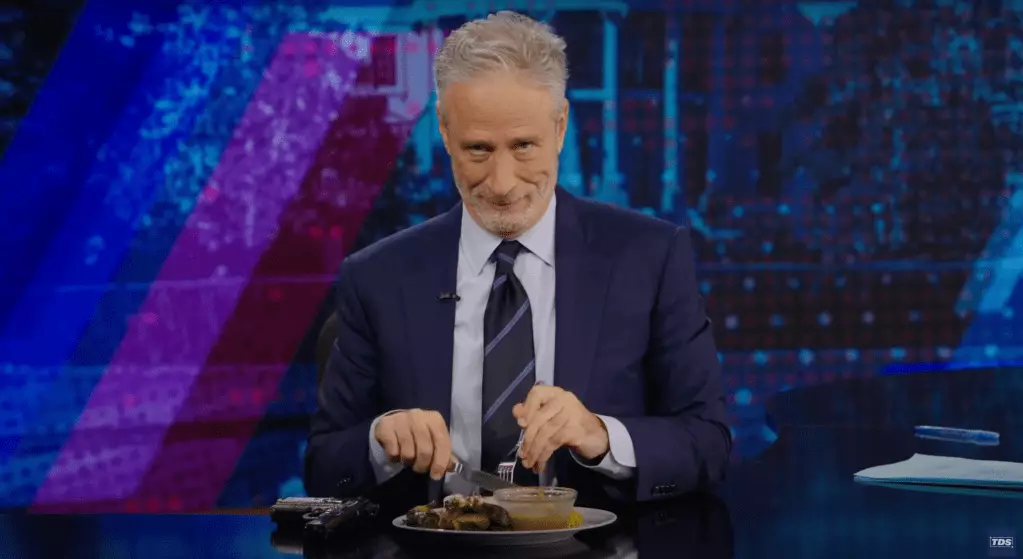Jon Stewart has long been a venerated figure in political satire, and in a recent episode of *The Daily Show*, he expanded his comedic repertoire by stepping into the shoes of Hunter Biden during a Thanksgiving skit. This theatrical gesture was accompanied by humorous jabs at his own acting ability, as well as weighty commentary on the current political landscape, blending humor with intense social critique. Through his approach, Stewart highlighted two significant themes: the ever-expanding nature of political loyalty and the ambiguous morality surrounding familial pardons.
Stewart’s portrayal of Hunter Biden at a family dinner, where he subtly hinted at the desire for a Christmas pardon from his father, President Joe Biden, exemplifies the absurdity intertwined with serious political dynamics. By presenting the scenario with a comedic flair, Stewart underscores an essential truth: political motives often manifest in familial relationships. His self-deprecating humor about his acting skills adds a layer of accessibility, making both his character and the social commentary more relatable to the audience. The image of a son winking at his father has dual implications—it calls to mind familial affection while simultaneously hinting at the desperate lengths individuals traverse in pursuit of self-preservation against political backlash.
The monologue quickly turns to the alarming nomination of Kash Patel as FBI director by Donald Trump—a choice met with audible jeers from the audience. This reaction sets the stage for a critical examination of loyalty amongst party lines, emphasizing the troubling dynamics of how the powerful manipulate public trust. Stewart’s quip about the crowd being “a little judgy” serves to heighten the satirical lens through which he critiques contemporary politics. By engaging the audience in this manner, he encourages viewers to reflect on their own biases amidst a landscape rife with questionable nominations and endorsements.
Moreover, Stewart’s playful parody of Patel’s children’s book—*The Plot Against the King*—as well as his Seussian line about meeting with Russia captures a sharp criticism of how political narratives are often wrapped in absurdity. Stewart’s comparison of political actors to characters from Dr. Seuss emphasizes the ridiculousness of the current situation, amplifying the absurdity that plagues political discourse. By leveraging humor and literary references, he effectively engages his audience to reconsider the normalization of unfounded and conspiratorial rhetoric in American politics.
In a particularly poignant moment, Stewart reflects on the importance of faith and the rule of law as what separates humans from various animalistic caricatures reminiscent of the popular film *Madagascar*. This clever analogy presents a crucial argument about the necessity of ethical governance. Here, he challenges the idea of moral superiority among Democrats, exposing the hypocrisy that permeates political discourse across party lines. Highlighting the need for a solid ethical foundation while poking fun at political hypocrisy adds a layer of complexity to the commentary—one that encourages a reconsideration of traditional moral judgments.
Toward the end of his monologue, Stewart takes on the topic of President Biden’s pardon of his son, raising eyebrows and laughter alike. His incredulous response—“Motherf—er, we were so close”—captures a sense of frustration felt by many observers of political family ties. Stewart squints at the sweeping nature of the pardon, pointing out how it covers multiple offenses, evoking humor from the precision of legal language and the often absurd specificity found in politics. His devil-may-care remarks about including potential future misdeeds and references to alternate realities speak to the surreal quality of contemporary political events—an illustration of how, more than ever, justice seems negotiable, particularly for powerful political figures.
Ultimately, Jon Stewart’s recent skit encapsulates the tension rife in modern-day politics through a lens of humor that doesn’t obscure its sharp critique. By combining theatricality with astute commentary, Stewart compels the audience to reflect on whether the dynamics of loyalty and pardon in politics are deserving of scrutiny or laughter. His unique blend of acting and analysis reveals the intricate tapestry of family, politics, and morality, leaving viewers with much to ponder about the ethical dilemmas presented by today’s political theater. Stewart’s comedic brilliance continuously breathes life into tough conversations, urging audiences to engage with the uncomfortable truths shrouded in political farce.
